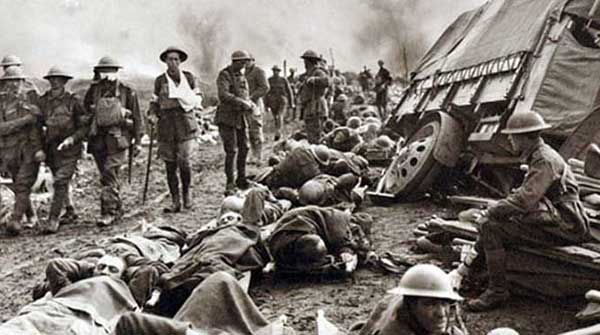The war battle for the values it was fought for – the defence of justice, rights and freedoms – never ceases
In Flanders fields the poppies blow
Between the crosses, row on row.

For interview requests, click here
It was at the funeral of his close friend and comrade Alexis Helmer that Lieutenant Colonel John McCrae was first moved to write his (now famous) poem. At the time of writing, he was physically and mentally exhausted, resting in the back of a field ambulance, shattered by war’s endless mud, blood and waste. Having survived 17 days of hell-on-earth in the Second Battle of Ypres, a grief-stricken McCrae was overwhelmed by the sight of red poppies growing amongst the field graves of the fallen.
That mark our place: and in the sky
The larks still bravely singing fly
Scarce heard amid the guns below.
They say nothing prepares you for war; once engaged, the Great War set a new standard in killing efficiency and followed its own unimaginable and unstoppable course of destruction. Death was ever present; Ypres was certainly no place for reflection or sentiment. But for McCrae, that single glimpse of life and hope amid a hellish nightmare awoke a spark of light. The rest is history.
We are the dead: Short days ago,
We lived, felt dawn, saw sunset glow,
Loved and were loved: and now we lie
In Flanders fields!
It was the near certainty of death that made the War and its sacrifice so important to our civilization, for what could possibly justify such a slaughterhouse? Only the defence of our precious freedoms; nothing else could warrant the loss.
After the First World War, inspired by McCrae’s poem, the red poppy came to symbolize this powerful emotion: to remind us all that war is not a game. It has its own logic of destruction and strikes at the very heart of our human soul.
War steals from us all that is most precious: our sense of compassion, our very humanity and life itself. It is only ‘worth’ it if society remembers the sacrifices and responds accordingly.
In the aftermath of the First World War, these sentiments drove major changes in society. For example, the lives of women and workingmen began to change dramatically. Those groups, which had absorbed the brunt of the war, were acknowledged, enfranchised with the vote and granted individual rights and collective freedoms – the spoils of war.
Recognizing that the efforts of the entire nation were required to prosecute the Great War, a new consciousness arose. Shocked by the injustices that existed in the living conditions of many after the War, major changes were made in the social safety net; minimum wages were introduced (for the first time); educational and social reforms were made to elevate the poor and the dispossessed.
Take up our quarrel with the foe
To you, from failing hands, we throw
The torch: be yours to hold it high.
Sentiments such as these are the eternal challenge from the soldier at war to the living. To me, it’s the battle cry of freedom, as the soldier walks through the shadow of death, sometimes accidentally – or maybe even heroically – performing their duty. They are also frightened and afraid. They need the rest of us – the living – to match their courage, to be their strength and hope.
If ye break faith with us who die,
We shall not sleep, though poppies grow
In Flanders fields.
The world we live in today was forged in the blood and mud of those trenches. That war is over a century gone, but the battle for the values it was fought for – the defence of justice, rights and freedoms – never ceases.
They are at external risk today. But our values, precious rights and freedoms are also in danger of ‘erosion’ by our own hand. Sacrificed without a shot, by the ‘living’ who lack the courage of their convictions, implemented by those who profess to protect us from ‘harm.’
To honour those who died in our name, we must match their courage. The dead will not rest if irrational fears cause us to lose our nerve. So let the poppies bloom and stand stalwart in defence of that which is most precious to us: and let us leave the dead to sleep.
Robert McGarvey is an economic historian and former managing director of Merlin Consulting, a London, U.K.-based consulting firm. Robert’s most recent book is Futuromics: A Guide to Thriving in Capitalism’s Third Wave.
The opinions expressed by our columnists and contributors are theirs alone and do not inherently or expressly reflect the views of our publication.
Troy Media
Troy Media is an editorial content provider to media outlets and its own hosted community news outlets across Canada.



Well done Bob, beautifully written, thoughtful and deeply felt. Very important subject. That poem, so often read but not realizing the true horror of what is described.